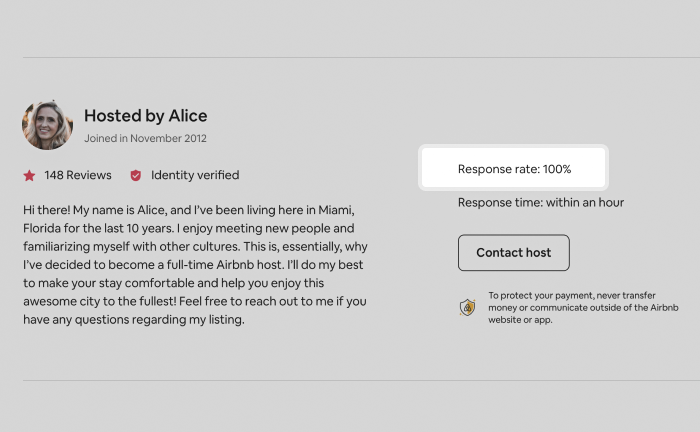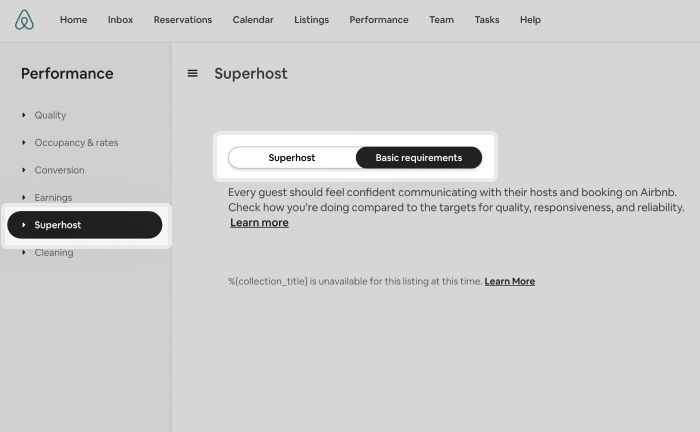How to Boost Your Airbnb Response Rate and Why You Should

Although Airbnb doesn’t fully disclose its ranking factors, one thing is clear — your Airbnb response rate can make or break your visibility on the platform. So, if you find your listing on the outskirts of Airbnb’s search results, it might be time to start working on your response rate more diligently. The good thing is that your response rate is not rigid, and you have a good chance to better it by putting in a bit more effort and playing it smart.
Read on to find out how the Airbnb response rate affects your listing and what strategies you can use to improve it.

What Is the Airbnb Response Rate and Time?
In addition to the response rate, Airbnb also measures your response time. Let’s take a closer look at both metrics.
Response Rate
The response rate measures the percentage of new inquiries and booking requests you’ve managed to respond to during a specific time frame. As Airbnb strives to ensure a seamless experience for guests, it emphasizes the importance of being a responsive host. If you are slow at your responses and tend to leave messages hanging, your response rate will drop.
Response Time
The response time is the average amount of time it takes you to respond to new guest inquiries and booking requests. Although Airbnb allows you to respond within 24 hours, the rule of thumb is to reply to your prospective guests as soon as a new message hits your Inbox.
By responding swiftly, you can remove the anxiety that guests might experience during the booking process. On top of that, you can secure more bookings, while delayed replies may result in lost revenue. Moreover, if you fail to reply within 48 hours, Airbnb will pause your listing.
How Is the Airbnb Response Rate Calculated?
To calculate your response rate, Airbnb uses the following formula: responded inquiries within 24 hours in the past 30 days / total number of inquiries received.
To keep your response rate up to standard, you need to reply to your guest messages within 24 hours. If this is the case, you can expect to have a 100% response rate.

When it comes to determining Superhost status, the platform takes into account your response rate for the last 365 days. It needs to be 90%+ within 24 hours to obtain the badge (if you meet the other Superhost program requirements). You can find your response rate for the last 365 days by clicking the Performance tab (Superhost) and then clicking Basic Requirements.

If you are a beginner host, you are unlikely to get too many messages right from the start. Therefore, if you’ve had fewer than 10 inquiries in a 30-day period, Airbnb will look at your performance during the past 90 days to calculate your response rate.
Does Airbnb Look at Subsequent Messages When Calculating the Response Rate?
Airbnb looks at the very first message in your conversation thread with a potential guest. Subsequent messages don’t affect your response rate. So, make sure that your potential guest will hear back from you within 24 hours of their first inquiry.
What Is the Difference Between Response Rate and Acceptance Rate?
Sometimes hosts may get confused by another metric that Airbnb tracks. While response rate is about measuring your responsiveness to inquiries, the acceptance rate looks at how often you accept or decline reservations.
The formula is accepted reservation requests / total number of reservation requests.
Airbnb excludes your guest inquiries when calculating your acceptance rate. To discuss the difference between the response rate and acceptance rate more precisely, it’s essential to shed light on the difference between an inquiry and a reservation request.
An inquiry is just a regular message that a potential guest sends you when they want to clarify some details of your listing. Perhaps, they are interested if you accept pets at your rental or provide a late checkout. To respond to an inquiry, you can answer the guest’s question, pre-approve, or decline it. If you choose to decline an inquiry, it will just show your potential guests that your rental is not a good fit for them, and they should continue their search. A declined inquiry won’t impact your acceptance rate.
A reservation request is a formal request from a potential guest to book your vacation rental. As a host, you’re supposed to take action on every incoming reservation request within 24 hours. You can either approve or decline it. If you let a request time out, Airbnb will consider it to be a decline. So, it’s essential to decide on any incoming request within 24 hours to maintain a high acceptance rate.
While the acceptance rate doesn’t have any impact on obtaining Superhost status, it’s crucial for becoming an Airbnb Plus host. It also influences your listing’s ranking in the search results.
According to Airbnb, you won’t get penalized for rare instances of not responding or declining a booking request. However, if you constantly ignore guest messages or decline reservation requests, you can end up finding your listing paused.
To check your acceptance rate for the last 365 days, click the Performance tab and then go to Basic Requirements.
How Your Response Rate Affects Your Position in the Airbnb Search Results
Alongside other ranking factors, your response rate affects your listing’s placement in the search results. Airbnb is guest-centric and communication plays a significant role in making the guest experience smooth and stress-free. Your guests are likely to have been browsing the platform for quite some time before they messaged you to learn more about your rental. Put yourself in your guest’s shoes, and you will realize why prompt responses matter. When looking for accommodation to rent out, we can’t wait to know whether it is still available.
Therefore, if you don’t get back to your prospective guests within 24 hours, it signals to Airbnb that your responsiveness doesn’t comply with its requirements and results in a negative user experience. That’s why, to ensure user satisfaction, Airbnb pushes listings of those hosts who handle their replies in a timely manner to the top.
Airbnb also prioritizes listings that have Instant Book on. Again, this is connected to the fact that Instant Book eliminates uncertainty from the booking process (guests don’t need to wait for a host’s approval of their booking) making the user interaction with the platform simple and straightforward.
Why Should You Keep Your Response Rate High?
It is clear to see that your response rate helps to propel your listing further in a sea of other hosts. However, ranking well in the search results is not the only benefit that you can get by maintaining your response rate up to par.
1. Secure more bookings
It comes as no surprise that by being prompt in your responses, you can get more bookings. If your listing gets enough exposure, you can expect more potential guests to contact you. The faster you reply to the incoming inquiries, the more bookings you will be able to secure.
Otherwise, if you fail to send a reply to your potential guests within 24 hours, they will have to resume their search and explore your competitors’ properties. This is something you don’t want if you aim to have your calendar filled with bookings for the months ahead.
2. Achieve Superhost status
Your response rate is one of the key factors that determine whether you are eligible for receiving Superhost status. Airbnb requires hosts to maintain a 90%+ response rate to obtain the coveted badge. Although achieving Superhost status doesn’t lead to an immediate increase in bookings, you will see an improvement over time. A Superhost badge adds credibility to your listing and entices more guests to book with you.
3. Increase your revenue
With increased visibility and a Superhost badge, you can naturally expect higher revenue. You can also bump up your nightly rate if you start receiving consistent bookings. As the data shows, Superhosts earn 60% more daily revenue than regular hosts. This way, you will be able to capitalize more on your short-term rental property. At the end of the day, your efforts and persistent work will pay off.
How Can You Improve Your Response Rate and Time on Airbnb?
Now it is time to set the ball rolling and find out how you can boost your response rate.
1. Reply to your guests and approve or decline every booking request within 24 hours
The most straightforward strategy is to respond to guest inquiries and reservation requests within 24 hours. Keep in mind that you need to decline any request that you don’t find suitable within 24 hours as well.
One of the secrets of a successful business is to be in the right place at the right time. So, you should be able to access your Inbox when a new message or booking request arrives. Make sure you are able to operate on the go, so your guests don’t have to wait for you to make it to your desktop finally.

Even if you manage only one rental, operational tasks tend to pile up. Messaging with your current and potential guests can turn into a challenge. To avoid burnout and save time on guest communication, it’s crucial to introduce other strategies that will simplify your guest communication process.
2. Create message templates
Creating message templates covering every stage of the booking process is a smart move for any host. It can help you save loads of valuable time.
The good news is that your guests don’t try to invent tricky questions. So, the inquiries that you encounter will look pretty standard. Take some time to analyze your guest messages and identify the most frequently asked questions. Then, to speed up your replies, craft templates with the answers to the questions that interest your potential guests the most. Chances are, you will identify gaps in your listing description while analyzing your guest inquiries. Finally, to reduce the number of guest messages, consider updating your description, keeping all your findings in mind.
This way, you will avoid long conversations with potential bookers and facilitate their decision-making process. Instead of numerous messages, you can expect more reservation requests that are easier to deal with.
3. Use automated messages
Automation is a breakthrough technology in short-term rental management. While message templates are great for ensuring faster replies, you still need to send them out manually.
Automated messages are messages that are sent by vacation rental software with an automated messaging feature. By utilizing this feature, you can save up to 70% of your time spent on regular guest communication. For example, iGMS vacation rental software helps hosts and property managers convert their most standard messages into templates and personalize them for every guest by using predefined message variables. This means, in every message, you will be able to feature specific check-in/checkout instructions, property information, etc.
You can set up messaging schedules to keep your guests informed at every stage of the booking process. Your preset messages will be sent out without your involvement!
The best part — you don’t need to worry about the very first message sent by your new potential guest. You can set up an automated reply and the software will respond to your guest inquiry in no time. You can be sure that your response time will improve and your response rate will go up.
4. Increase the effectiveness of your guest communication team
As communication is one of the most time-consuming tasks that hosts need to handle, it is no wonder that more and more vacation rental professionals choose to outsource this process or have a dedicated guest communication team in place. While a team of support agents can take some of the workload off your shoulders, as a business owner, you still need to stay on top of their performance. But how would you measure your team’s effectiveness without the right tool in place?
To help you ensure your team makes the best use of their work hours, iGMS offers an exclusive add-on functionality — PROtrack. PROtrack auto-assigns guest messages to your support agents, evenly distributes the workload, monitors your team’s performance in real time, and provides you with robust reporting. With this feature up your sleeve, you can immediately address dips in your team’s productivity, so your guest experience won’t get affected.
5. Embrace automation to streamline your hosting operations
Although a response rate is one of the underlying factors of the Airbnb search algorithm, there are an array of other aspects you need to work on to generate bookings and revenue. Thanks to vacation rental software like iGMS, you can streamline all your hosting operations. From syncing bookings on the top vacation rental platforms to managing direct bookings — iGMS covers all the tasks and puts your business, literally, on autopilot.
About the Author
Olga Vasylieva is the Content and Social Media Team Lead at iGMS. Olga is on a mission to help hosts and property managers grow their businesses and deliver an excellent guest experience. She is a travel enthusiast and is inspired by life in all its aspects.





![Your Monthly iGMS Roundup [February 2020]](/content/images/size/w600/wordpress/2020/02/igms-roundup-feb-2020-cover.png)

